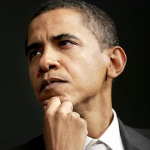On Libya: Europe Leads, Obama Stalls
 There's a striking paradox over the response to Libya: those with the will to act (France) don't have the means; those with the means (the US) don't have the will.
There's a striking paradox over the response to Libya: those with the will to act (France) don't have the means; those with the means (the US) don't have the will.
Here's text of a statement from the French government on Libya. It raises a striking paradox about Libya: those who have the will to act (France, Britain) don't have the means; those who have the means (the US) do not have the will. It's a reminder that a European foreign policy depends upon Europe committing the required resources. But the words are stirring even so:
The text in full:
Since the Libyan people have started to rise against Muammar Gaddafi’s brutal regime, the world is witnessing on a daily basis an unacceptable continuation of violence and repression in Libya. Ignoring UN Security Council resolution 1970 demands as well as calls from regional organisations and the whole international community, Gaddafi’s regime continues to attack his own people including with aircraft and helicopters. It is clear to us that the regime has lost any legitimacy it may have once had.
This deliberate use of military force against civilians is utterly unacceptable. As warned by the Security Council, these acts may amount to crimes against humanity. All those involved in deciding, planning or executing such actions must know that they will be held accountable.
France and the UK are committed to the sovereignty, independence, territorial integrity and national unity of Libya. We support the Libyan peoples desire to choose their own leadership and to decide their own political system. We welcome the formation of an Interim Transitional National Council based in Benghazi and we are engaging with the Council and its members to develop a cooperative dialogue.
When the Libyan people win their fundamental rights, we should be ready to support them with the necessary assistance and cooperation, in order to promote stability and development in Libya, for the benefit of all Libyans.
Today’s priority is to cope with the political and security situation.
To that end, we propose to our European partners, our Allies, and our Arab and African friends to undertake the following steps:
1.) To stop further suffering of the Libyan people, Muammar Gaddafi and his clique should leave.
2.) We support the efforts of the Libyan Interim Transitional National Council to prepare for a representative and accountable government. We should send the clear political signal that we consider the Council to be valid political interlocutors, and an important voice for the Libyan people in this phase.
3.) We condemn, and call for an immediate halt to, the use of force against civilians by the Gaddafi regime. We support continued planning to be ready to provide support for all possible contingencies as the situation evolves on the basis of demonstrable need, a clear legal basis and firm regional support. This could include a no-fly zone or other options against air attacks, working with Allies and partners, especially those in the region. We are working together on elements of an appropriate UNSCR.
4.) We call upon the UN to evaluate and closely monitor the humanitarian situation in Libya, and to make proposals to ensure full access for humanitarian organisations and assistance to displaced people. We stand ready to help in this endeavour.
5.) We support the investigation announced by the International Criminal Court Prosecutor, and the message this sends that the regime will be held to account for its actions.
6.) We call on all countries to implement fully the arms embargo, including banning the provision of armed mercenary personnel and to take measures to discourage such recruitments, or departure of planes or convoys to that end, and we stand ready to co-operate with them in this regard.
7.) Regarding displaced persons outside Libya, should the situation deteriorate, we should all be ready to act through further financial and material assistance, including military assets, in cooperation with international organisations and countries concerned.
We are copying this letter to colleagues on the European Council.